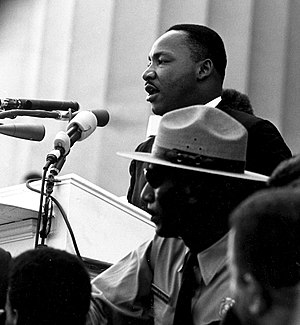Portal:1960s
The 1960s Portal
The 1960s became synonymous with the new, radical, and subversive events and trends of the period. In Africa the 1960s was a period of radical political change as 32 countries gained independence from their European colonial rulers. Some commentators have seen in this era a classical Jungian nightmare cycle, where a rigid culture, unable to contain the demands for greater individual freedom, broke free of the social constraints of the previous age through extreme deviation from the norm. Christopher Booker charts the rise, success, fall/nightmare and explosion in the London scene of the 1960s. However, this alone does not explain the mass nature of the phenomenon. Several nations such as the U.S., France, Germany and Britain turned to the left in the early and mid 1960s. In the United States, John F. Kennedy, a Keynesian and staunch anti-communist, pushed for social reforms. His assassination in 1963 was a stunning shock. Liberal reforms were finally passed under Lyndon B. Johnson including civil rights for African Americans and healthcare for the elderly and the poor. Despite his large-scale Great Society programs, Johnson was increasingly reviled by the New Left at home and abroad. The heavy-handed American role in the Vietnam War outraged student protestors across the globe, as they found peasant rebellion typified by Ho Chi Minh and Che Guevara more appealing. Italy formed its first left-of-center government in March 1962 with a coalition of Christian Democrats, Social Democrats, and moderate Republicans. Socialists joined the ruling block in December 1963. In Britain, the Labour Party gained power in 1964. In Brazil, João Goulart became president after Jânio Quadros resigned. This is a Featured article, which represents some of the best content on English Wikipedia..
Sgt. Pepper's Lonely Hearts Club Band is the eighth studio album by the English rock band the Beatles. Released on 26 May 1967, Sgt. Pepper is regarded by musicologists as an early concept album that advanced the roles of sound composition, extended form, psychedelic imagery, record sleeves, and the producer in popular music. The album had an immediate cross-generational impact and was associated with numerous touchstones of the era's youth culture, such as fashion, drugs, mysticism, and a sense of optimism and empowerment. Critics lauded the album for its innovations in songwriting, production and graphic design, for bridging a cultural divide between popular music and high art, and for reflecting the interests of contemporary youth and the counterculture. At the end of August 1966, the Beatles had permanently retired from touring and pursued individual interests for the next three months. During a return flight to London in November, Paul McCartney had an idea for a song involving an Edwardian military band that formed the impetus of the Sgt. Pepper concept. For this project, they continued the technological experimentation marked by their previous album, Revolver (1966), this time without an absolute deadline for completion. Sessions began on 24 November at EMI Studios with compositions inspired by the Beatles' youth, but after pressure from EMI, the songs "Strawberry Fields Forever" and "Penny Lane" were released as a double A-side single in February 1967 and left off the LP. The album was then loosely conceptualised as a performance by the fictional Sgt. Pepper band, an idea that was conceived after recording the title track. (Full article...) This is a Good article, an article that meets a core set of high editorial standards.
Black Sabbath were an English rock band formed in Birmingham in 1968 by guitarist Tony Iommi, drummer Bill Ward, bassist Geezer Butler, and vocalist Ozzy Osbourne. They are often cited as pioneers of heavy metal music. The band helped define the genre with their first three albums Black Sabbath, Paranoid (both 1970), and Master of Reality (1971). Following Osbourne's departure in 1979, the band underwent multiple line-up changes, with Iommi being the only constant member throughout its history. After previous iterations of the group – the Polka Tulk Blues Band, and Earth – the band settled on the name Black Sabbath in 1969. They distinguished themselves through occult themes with horror-inspired lyrics and down-tuned guitars. Signing to Philips Records in November 1969, they released their first single, a cover of the Crow song "Evil Woman", in January 1970, and their debut album, Black Sabbath, was released the following month. Though it received a negative critical response, the album was a commercial success, leading to a follow-up record, Paranoid, later that year. The band's popularity grew, and by 1973's Sabbath Bloody Sabbath, critics were starting to respond favourably. This album, along with its predecessor Vol. 4 (1972) and its successors Sabotage (1975), Technical Ecstasy (1976) and Never Say Die! (1978), saw the band explore more experimental and progressive styles. (Full article...) Selected picture - United States President Lyndon B. Johnson (seated) signs the Civil Rights Act of 1964, a landmark piece of legislation that outlawed racial segregation in schools, public places, and employment. Among the guests behind him is Martin Luther King Jr. (directly behind and to the right of Johnson).
Did you know -
Related portalsThis is a Featured article, which represents some of the best content on English Wikipedia..
Frank Vincent Zappa (/ˈzæpə/ ZAP-ə; December 21, 1940 – December 4, 1993) was an American musician, composer, and bandleader. In a career spanning more than 30 years, Zappa composed rock, pop, jazz, jazz fusion, orchestral and musique concrète works; he also produced almost all of the 60-plus albums that he released with his band the Mothers of Invention and as a solo artist. His work is characterized by nonconformity, improvisation sound experimentation, musical virtuosity and satire of American culture. Zappa also directed feature-length films and music videos, and designed album covers. He is considered one of the most innovative and stylistically diverse musicians of his generation. As a mostly self-taught composer and performer, Zappa had diverse musical influences that led him to create music that was sometimes difficult to categorize. While in his teens, he acquired a taste for 20th-century classical modernism, African-American rhythm and blues, and doo-wop music. He began writing classical music in high school, while simultaneously playing drums in rhythm and blues bands, later switching to electric guitar. His debut studio album with the Mothers of Invention, Freak Out! (1966), combined satirical but seemingly conventional rock and roll songs with extended sound collages. He continued this eclectic and experimental approach throughout his career. (Full article...) This is a Good article, an article that meets a core set of high editorial standards.
Leonid Ilyich Brezhnev[a] (19 December 1906 – 10 November 1982) was a Soviet politician who served as General Secretary of the Communist Party of the Soviet Union from 1964 until his death in 1982, and Chairman of the Presidium of the Supreme Soviet (head of state) from 1960 to 1964 and again from 1977 to 1982. His 18-year term as General Secretary was second only to Joseph Stalin's in duration. Brezhnev was born to a working-class family in Kamenskoye (now Kamianske, Ukraine) within the Yekaterinoslav Governorate of the Russian Empire. After the results of the October Revolution were finalized with the creation of the Soviet Union, Brezhnev joined the Communist party's youth league in 1923 before becoming an official party member in 1929. When Nazi Germany invaded the Soviet Union in June 1941, he joined the Red Army as a commissar and rose rapidly through the ranks to become a major general during World War II. Following the war's end, Brezhnev was promoted to the party's Central Committee in 1952 and became a full member of the Politburo by 1957. In 1964, he consolidated enough power to replace Nikita Khrushchev as First Secretary of the CPSU, the most powerful position in the country. (Full article...) Selected article -The 1964 Winter Olympics, officially known as the IX Olympic Winter Games (German: IX. Olympische Winterspiele) and commonly known as Innsbruck 1964 (Austro-Bavarian: Innschbruck 1964), were a winter multi-sport event which was celebrated in Innsbruck, Austria, from January 29 to February 9, 1964. The city was already an Olympic candidate, unsuccessfully bidding to host the 1960 Games. Innsbruck won the 1964 Games bid, defeating the cities of Calgary in Canada and Lahti in Finland. The sports venues, many of which were built for the Games, were located within a radius of 20 km (12 mi) around Innsbruck. The Games included 1,091 athletes from 36 nations, which was a record for the Winter Games at the time. Athletes participated in six sports and ten disciplines which bring together a total of thirty-four official events, seven more than the 1960 Winter Olympic Games. The luge made its debut on the Olympic program. Three Asian nations made their Winter Games debut: North Korea, India and Mongolia. The Soviet Union broke the record for the most gold and overall medals at a single Winter Olympics, with eleven and twenty five respectively, and finished first in the medal table. The USSR was followed by Austria, the host country, which won twelve medals, four of which were gold. Soviet athletes Lidia Skoblikova won all four women's races of speed skating and Klavdiya Boyarskikh won all three events of cross-country skiing. The Swedish cross-country skier Sixten Jernberg, a three-time medalist at these Games, became the first athlete to collect nine medals at the Winter Games. In alpine skiing, the French sisters Christine and Marielle Goitschel each obtained a gold and a silver medal. Before the Games, the Austrian army was mobilized to deal with the lack of snow. They brought thousands of cubic meters of it from Brenner Pass, close to the Italian border. The Olympic Winter Games was held for a second time at Innsbruck in 1976. (Full article...) More Did you know (auto generated)
TopicsCategoriesWikiProjects
Associated WikimediaThe following Wikimedia Foundation sister projects provide more on this subject:
Discover Wikipedia using portals |
- ^ In this name that follows Eastern Slavic naming customs, the patronymic is Ilyich and the family name is Brezhnev.





























